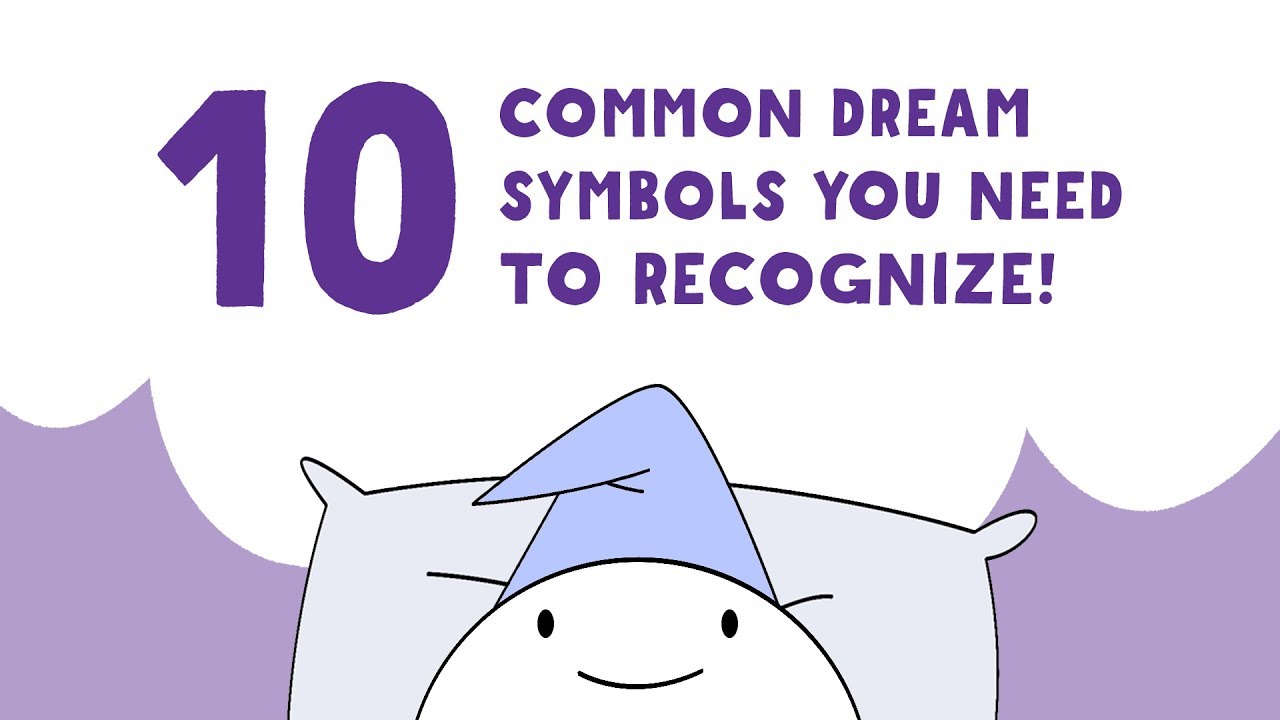Dream Symbols - Unraveling The Mystery
Dream symbols are images, objects, or scenarios that appear in our dreams and hold a significant meaning or message. These symbols can be personal or universal, reflecting our unconscious thoughts, feelings, fears, and desires.
Author:Suleman ShahReviewer:Han JuApr 05, 202325K Shares490.4K Views

Dream symbolsare images, objects, or scenarios that appear in our dreams and hold a significant meaning or message. These symbols can be personal or universal, reflecting our unconscious thoughts, feelings, fears, and desires.
Dream symbols have been studied and analyzed for centuries by psychologists, spiritualists, and cultures across the world, and they offer valuable insights into our inner world and psyche.
In this article, we will explore the fascinating world of dream symbols, their meanings, and how they can help us better understand ourselves.
What Are Dream Symbols?
Dream symbols are objects, people, or situations that appear within a dream and hold significant meaning. These symbols can be both universal and personal.
Universal symbols are those that have a commonly accepted meaning across different cultures and time periods.
For example, water often represents emotions or the subconscious mind, while snakes are often seen as symbols of transformation or danger.
Personal symbols, on the other hand, are unique to the individual dreamer and may hold specific meanings based on their personal experiences and beliefs.
For example, a person who has a fear of dogs may see a dog in their dream as a symbol of fear, while someone who loves dogs may see them as a symbol of comfort and companionship.
Dream Symbols And Their Significance
Dreams are often full of symbols and imagery that can be difficult to interpret. These symbols can be anything from animals to objects to people, and they can hold great meaning in the dreamer's life.
Understanding the significance of these symbols can help individuals gain insights into their own subconscious minds and the issues they may be facing. In this article, we will explore some common dream symbols and their significance.
Animals
Animals are a common symbol in dreams, and their meaning can vary depending on the animal itself. For example, a snake can represent transformation or healing, while a wolf can represent strength and intuition.
The context in which the animal appears in the dream can also affect its meaning. For instance, a friendly dog may represent loyalty and companionship, while a snarling dog may represent fear or aggression.
Water
Water is another common dream symbol, and it can represent emotions and the subconscious mind.
Calm, clear water may indicate peace and tranquility, while rough, choppy water may represent turmoil or uncertainty. Drowning in water can signify feelings of being overwhelmed or out of control.
Flying
Dreams about flying can symbolize freedom, liberation, or a desire to escape. They can also represent a sense of control or power, as the dreamer is able to soar above the ground and take on new perspectives.
Objects
Objects can also hold significant meaning in dreams. For instance, a car may represent the dreamer's path in life, while a mirror may represent self-reflection or introspection.
A clock may represent the passage of time, while a key can represent access or entry to new opportunities.
People
People are perhaps the most common dream symbol, and they can represent different aspects of the dreamer's self or life.
For instance, a family member may represent a certain trait or characteristic, while a stranger may represent the unknown or new possibilities.
Paying attention to the actions and emotions of the people in the dream can provide clues to their significance.
Overall, dream symbols can offer powerful insights into the subconscious mind and the issues that individuals may be facing in their waking lives.
By paying attention to these symbols and their significance, individuals can gain a deeper understanding of themselves and their journey through life.

10 Common Dream Symbols You NEED to Recognize!
Interpreting Dream Symbols
Interpreting dream symbols can be a complex process and can vary depending on the individual dreamer's experiences and beliefs.
However, there are some general guidelines that can be followed when interpreting dream symbols:
Consider The Context
The context of the dream can greatly impact the meaning of the symbols within it. For example, a snake in a dream may represent danger or transformation, but if the dreamer is handling the snake with ease and confidence, it may represent the dreamer's ability to confront and overcome challenges.
Look For Patterns
Recurring symbols within a dream or across multiple dreams can hold significant meaning.
For example, if a dreamer repeatedly dreams about being chased, it may represent a feeling of being pursued or threatened in their waking life.
Consider Personal Associations
Dream symbols can hold different meanings for different people based on their personal experiences and beliefs.
For example, a dream about a spider may represent fear or disgust for some, while othersmay see it as a symbol of creativity and feminine energy.
The Science Of Dream Symbols
Dream symbols have long fascinated people and are often associated with the interpretation of dreams.
While some view dreams and their symbols as purely mystical or spiritual, others see them as manifestations of the brain's cognitive processes.
In recent years, there has been a growing interest in the scientific study of dreams and their symbols.
Researchers have used neuroimaging techniques to better understand the neural basis of dreaming and how it relates to the processing of emotions and memories in the brain.
Some scientists believe that dream symbols may be a way for the brain to process and make sense of the various stimuli it receives throughout the day.
Others suggest that dream symbols may be a way for the brain to work through unresolved emotional issues or traumas.
Despite the scientific interest in dream symbols, much of the interpretation of dreams and their symbols remains rooted in cultural and historical contexts.
Many people turn to psychologists or spiritual practitioners for help in understanding the meaning of their dreams and the symbols they contain.
Regardless of one's beliefs about the meaning of dream symbols, they remain a fascinating and mysterious aspect of the human experience.
By continuing to study the scienceof dreams and their symbols, we may gain a better understanding of their significance and how they can be used to improve mental healthand well-being.
People Also Ask
Can Dream Symbols Have Different Meanings For Different People?
Yes, dream symbols can have different meanings for different people. This is because dreams are highly personal and can be influenced by an individual's experiences, beliefs, and emotions.
For example, a dream about a spider may be interpreted as a positive symbol for someone who admires spiders and finds them beautiful, while it may be interpreted as a negative symbol for someone who is afraid of spiders.
What Are Some Common Dream Symbols And Their Meanings?
Common dream symbols and their meanings include flying (freedom or control), water (emotion or the subconscious), teeth (self-confidence or insecurity), falling (insecurity or lack of control), and death (change or transformation).
However, it's important to note that the meanings of these symbols can vary based on individual experiences and beliefs.
Can Dream Symbols Change Over Time?
Yes, dream symbols can change over time. As a person's experiences, beliefs, and emotions change, the way they interpret certain symbols in their dreams may also change.
For example, a person who once interpreted a dream about a snake as a symbol of fear may later interpret it as a symbol of transformation or healing.
Can Dream Symbols Predict The Future?
While some people believe that certain dream symbols can predict the future, there is no scientific evidence to support this claim. Dreams are highly personal and are often influenced by a person's subconscious mind, experiences, and emotions.
While they can provide insights into a person's thoughts and feelings, they should not be relied upon as a means of predicting the future.
Can Dream Symbols Be Interpreted By Anyone?
While anyone can interpret dream symbols, it's important to remember that the interpretation of dreams is highly subjective and personal.
The best person to interpret a dream is the dreamer themselves, as they have the most insight into their own thoughts, feelings, and experiences.
However, professional dream analysts can provide guidance and support for those who are struggling to understand their dreams.
Final Thoughts
Dream symbols can provide valuable insight into the subconscious mind and the dreamer's inner world. Interpreting these symbols can help individuals gain a better understanding of their emotions, desires, and fears.
However, it's important to remember that the meaning of dream symbols is highly subjective and can vary depending on the individual. As such, it's important

Suleman Shah
Author
Suleman Shah is a researcher and freelance writer. As a researcher, he has worked with MNS University of Agriculture, Multan (Pakistan) and Texas A & M University (USA). He regularly writes science articles and blogs for science news website immersse.com and open access publishers OA Publishing London and Scientific Times. He loves to keep himself updated on scientific developments and convert these developments into everyday language to update the readers about the developments in the scientific era. His primary research focus is Plant sciences, and he contributed to this field by publishing his research in scientific journals and presenting his work at many Conferences.
Shah graduated from the University of Agriculture Faisalabad (Pakistan) and started his professional carrier with Jaffer Agro Services and later with the Agriculture Department of the Government of Pakistan. His research interest compelled and attracted him to proceed with his carrier in Plant sciences research. So, he started his Ph.D. in Soil Science at MNS University of Agriculture Multan (Pakistan). Later, he started working as a visiting scholar with Texas A&M University (USA).
Shah’s experience with big Open Excess publishers like Springers, Frontiers, MDPI, etc., testified to his belief in Open Access as a barrier-removing mechanism between researchers and the readers of their research. Shah believes that Open Access is revolutionizing the publication process and benefitting research in all fields.

Han Ju
Reviewer
Hello! I'm Han Ju, the heart behind World Wide Journals. My life is a unique tapestry woven from the threads of news, spirituality, and science, enriched by melodies from my guitar. Raised amidst tales of the ancient and the arcane, I developed a keen eye for the stories that truly matter. Through my work, I seek to bridge the seen with the unseen, marrying the rigor of science with the depth of spirituality.
Each article at World Wide Journals is a piece of this ongoing quest, blending analysis with personal reflection. Whether exploring quantum frontiers or strumming chords under the stars, my aim is to inspire and provoke thought, inviting you into a world where every discovery is a note in the grand symphony of existence.
Welcome aboard this journey of insight and exploration, where curiosity leads and music guides.
Latest Articles
Popular Articles